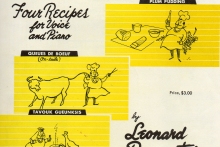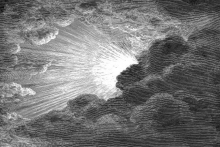After Bernstein's performance at the White House in 1960, President Eisenhower remarked, "You know, I liked that last piece you played: it's got a theme. I like music with a theme, not all them arias and barcarolles."
Works
-
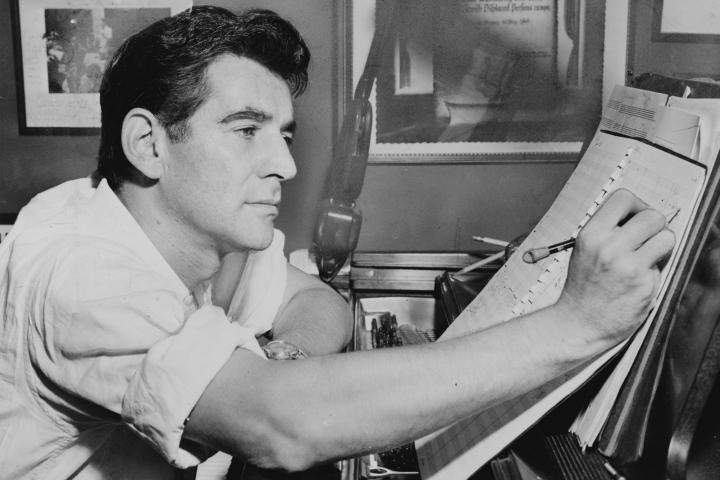 "Few composers capture their time and become the iconic voice of their age. Leonard Bernstein found his "voice" in the early 1940s and projected the sound of urban and urbane America from the period of World War II to the anti-war movements of the 1970s and the restoration of freedom in Europe, with the fall of the Berlin Wall and Soviet communism."
"Few composers capture their time and become the iconic voice of their age. Leonard Bernstein found his "voice" in the early 1940s and projected the sound of urban and urbane America from the period of World War II to the anti-war movements of the 1970s and the restoration of freedom in Europe, with the fall of the Berlin Wall and Soviet communism."
-Conductor John Mauceri
(Photo by Al Ravenna, 1955; via Wikimedia Commons)
Questions about programming, performing, and licensing?
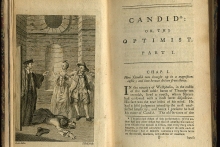
The comic operetta, Candide, captures Voltaire's depiction of the cynicism of society expressed through the protangonist's education in optimism, banishment from his beloved Cunegonde, travels, trials, and disillusionment with humanity, before ending on a hopeful tone in "Make Our Garden Grow".
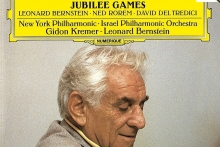
One of Bernstein’s last works, the Concerto for Orchestra was written for the 50th anniversary of the founding of the Israel Philharmonic Orchestra.
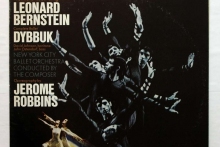
Dybbuk, a ballet by Leonard Bernstein and Jerome Robbins, is a fascinating exploration of Jewish mysticism, full of ghostly spirits and black magic. The score by Bernstein is among his most atonal and serialist compositions.
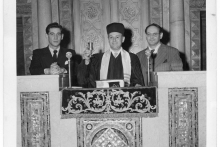
Hashkiveinu is the result of a commissioning project from 1943 to 1976 by Cantor Dr. David Putterman for a series of contemporary music at Park Avenue Synagogue in New York City. The work uses the prayer text from the Jewish Sabbath evening service and is sung in Hebrew, and the transliterated sco…
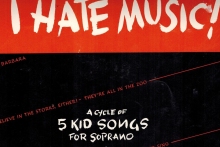
I Hate Music!: A Cycle of Five Kid Songs is dedicated to Edys Merril, a friend of Bernstein's, as well as an artist and his flatmate in the 1940s. Apparently, when fed up with hearing Bernstein constantly coaching singers and playing piano, she often uttered the title phrase. The cycle was prem…

The eclecticism of MASS's music reflects the multifaceted nature of Bernstein's career, with blues, rock, gospel, folk, Broadway and jazz idioms appearing side by side with 12-tone serialism, symphonic marches, solemn hymns, Middle Eastern dances, orchestral meditations, and lush chorales, all un…
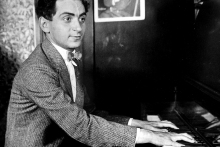
Composed in honor of Irving Berlin's 100th Birthday, Bernstein mixes a twelve-tone row with a distorted version of two Berlin songs "My Russian Lullaby" - remembered nostalgically from LB's youth - and "Always".

On the Town has been a classic since its original Broadway run in 1944, the show highlights the fleeting encounters and visceral energy of youth as three young sailors find love and excitement while on leave in New York City during one 24-hour period.
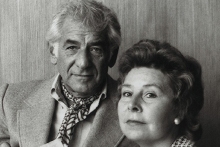
Written on the occasion of Karl Boehm's eighty-fifth birthday: "with affection from his admiring colleague," and completed in Munich, 25 August 1979, Bernstein's birthday. The nonsense words imply Hassidic vocalizations.
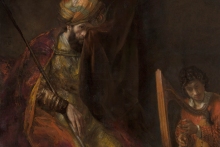
While this early Bernstein composition gives no indication of his eventual compositional style, it does reveal the musical environment to which he was exposed as a youngster at his family’s congregation—specifically the music of Solomon Braslavsky.
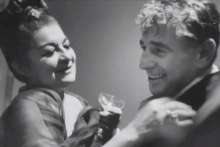
Bernstein wrote this piece in honor of the forty-first birthday of his friend mezzo-soprano Jennie Tourel. The song incorporates an old Lebanese folksong, the Arabic words of which are paraphrased in the lyrics: “The boys in the dark olive groves assemble.” Bernstein can be heard singing this …
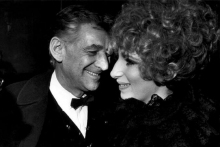
So Pretty is a 1968 anti-war song by Leonard Bernstein to lyrics by Betty Comden and Adolph Green, composed for a Broadway for Peace fundraiser at Lincoln Center's Philharmonic Hall to support the Congressional Peace Campaign Committee, which funded campaigns of congressional candidates opposing t…
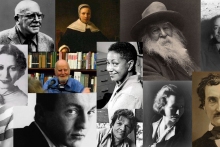
In Songfest, Berstein encapsulated 300 years of his nation's history through the words of 13 American poets. The subject matter of their poetry is the American artist's experience as it relates to his or her creativity, loves, marriages, or minority problems (blacks, women, homosexuals, expatria…
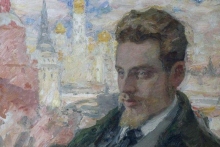
In 1949, Bernstein set a pair of texts by the poet Rainer Maria Rilke, the first of which, Extinguish My Eyes, was introduced that same year by mezzo-soprano Jennie Tourel at Town Hall in New York. It wasn’t until 1963 that she premiered the second song, When My Soul Touches Yours.

